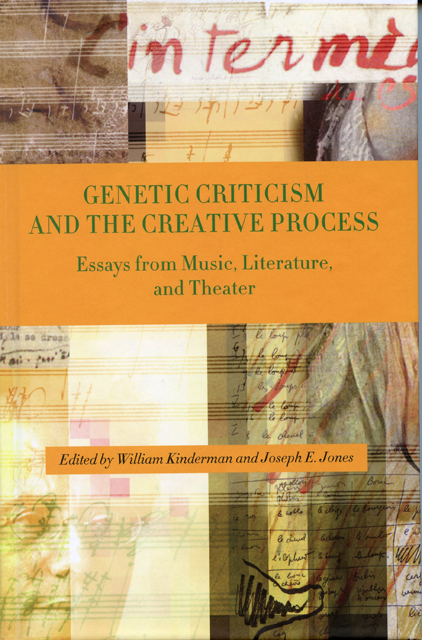Book contents
- Frontmatter
- Contents
- Acknowledgments
- Genetic Criticism and the Creative Process
- 1 Texts, Variants, and Variations: Evolving Contexts in Literature and Theater
- 2 Genetic Processes in Music: From Beethoven to Leroux
- 1 From Varieties of Genetic Experience to Radical Philology
- 2 Variant and Variation: Toward a Freudo-bathmologico-Bakhtino-Goodmanian Genetic Model?
- 3 The Genetic Record of a Voice: Variants in Barthes's Le Plaisir du texte
- 4 Can Genetic Criticism Be Applied to the Performing Arts?
- 5 “The hardy Laurel”: Beckett and Early Film Comedy
- 6 From Melodic Patterns to Themes: The Sketches for the Original Version of Beethoven's “Waldstein” Sonata, Op. 53
- 7 From Conceptual Image to Realization: Some Thoughts on Beethoven's Sketches
- 8 The Process within the Product: Exploratory Transitional Passages in Beethoven's Late Quartet Sketches
- 9 “They Only Give Rise to Misunderstandings”: Mahler's Sketches in Context
- 10 A Study of Richard Strauss's Creative Process: Der Rosenkavalier's “Presentation Scene” and “Schlußduett”
- 11 Genetic Criticism and Cognitive Anthropology: A Reconstruction of Philippe Leroux's Compositional Process for Voi(rex)
- Afterword
- Contributors
- Index
1 - From Varieties of Genetic Experience to Radical Philology
Published online by Cambridge University Press: 02 March 2023
- Frontmatter
- Contents
- Acknowledgments
- Genetic Criticism and the Creative Process
- 1 Texts, Variants, and Variations: Evolving Contexts in Literature and Theater
- 2 Genetic Processes in Music: From Beethoven to Leroux
- 1 From Varieties of Genetic Experience to Radical Philology
- 2 Variant and Variation: Toward a Freudo-bathmologico-Bakhtino-Goodmanian Genetic Model?
- 3 The Genetic Record of a Voice: Variants in Barthes's Le Plaisir du texte
- 4 Can Genetic Criticism Be Applied to the Performing Arts?
- 5 “The hardy Laurel”: Beckett and Early Film Comedy
- 6 From Melodic Patterns to Themes: The Sketches for the Original Version of Beethoven's “Waldstein” Sonata, Op. 53
- 7 From Conceptual Image to Realization: Some Thoughts on Beethoven's Sketches
- 8 The Process within the Product: Exploratory Transitional Passages in Beethoven's Late Quartet Sketches
- 9 “They Only Give Rise to Misunderstandings”: Mahler's Sketches in Context
- 10 A Study of Richard Strauss's Creative Process: Der Rosenkavalier's “Presentation Scene” and “Schlußduett”
- 11 Genetic Criticism and Cognitive Anthropology: A Reconstruction of Philippe Leroux's Compositional Process for Voi(rex)
- Afterword
- Contributors
- Index
Summary
At a conference in honor of Hans Walter Gabler, Louis Hay, the founder of critique génétique, demonstrated that in France, the success of genetic criticism has been challenged. Apparently, French genetic critics have been so successful that they have been exposed to a torrent of abuse. Since genetic criticism, with some notable exceptions, has not made a significant impact on the study of English literature, some of us might be jealous of such a backlash; at the very least, it shows that in France, genetic criticism has acquired the status of a dominant paradigm that merits questioning and challenging. My own field, the study of the work of James Joyce, has been especially open to critical and theoretical fashions for reasons that I address in my book The French Joyce. It is only in recent years that the genetic study of Joyce's work has graduated from its position as a respectable but minor subject of interest into a subfield that, at least in Europe, seems to attract a considerable number of graduate students who view genetic Joyce studies as an interesting alternative to the currently popular theoretical approaches such as postcolonial or cultural studies. In the manner of all enthusiasts, these new converts tend to emphasize the novelty of the approach.
Both in the restricted context of Joyce studies and in the context of the wider field of textual studies, I propose a more liberal approach that stresses the continuity of genetic criticism with the more traditional fields of bibliography, textual study, and edition theory. In the case of the study of the works of James Joyce, I see no qualitative difference, for example, between the work of David Hayman and A. Walton Litz in the 1950s and 1960s,1 on the one hand, and the much more recent work of the “genetic” scholars, on the other. In fact, the same kind of work is still undertaken by scholars such as Hayman, and despite the impact of “theory” on the field (and on the intellectual career of Hayman himself), there seems to be no substantive difference between the pre-theoretical and the post-theoretical work.
- Type
- Chapter
- Information
- Genetic Criticism and the Creative ProcessEssays from Music, Literature, and Theater, pp. 19 - 34Publisher: Boydell & BrewerPrint publication year: 2009
- 1
- Cited by



